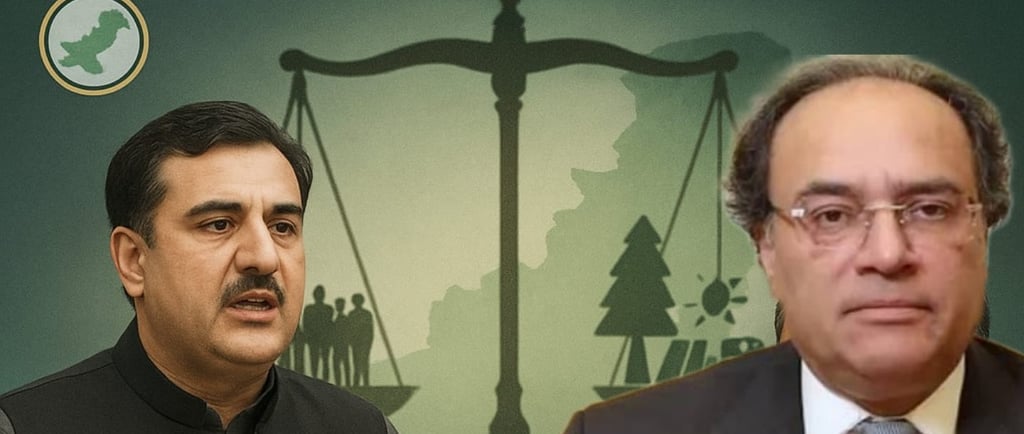Big Shake-Up in NFC Award: Khyber-Pakhtunkhwa Pushes for Forests, Dams & Climate Over Population Count
Khyber-Pakhtunkhwa demands a major change in Pakistan’s 11th NFC Award formula — reducing the population share and including forests, dams, and climate resilience. A new chapter in provincial resource distribution begins.
NATIONALBUSINESS
8/25/20252 min read


Khyber-Pakhtunkhwa Seeks New Formula in 11th NFC Award: Forests & Prosperity to Replace Population Weightage
ISLAMABAD:
Just days before the first session of the 11th National Finance Commission (NFC) Award, Khyber-Pakhtunkhwa (K-P) has called for a major revision in the resource-sharing formula. The provincial government is urging a drastic reduction in the population-based share and the addition of new benchmarks such as forestation, prosperity, and climate resilience.
At present, nearly 82% of the NFC resources are allocated on the basis of population, while 10.6% is distributed according to backwardness, explained K-P Finance Minister Muzzammil Aslam during a seminar hosted by the Federation of Pakistan Chambers of Commerce and Industry (FPCCI) under its Prosper Pakistan platform.
K-P’s Proposed Changes to NFC Formula
Minister Aslam emphasized that the provincial government will push for:
Reducing population weightage in the award.
Introducing forestation as a new criterion.
Accounting for prosperity levels in distribution.
His stance aligns with recent remarks from Planning Minister Ahsan Iqbal, who suggested capping the official population count at 241.5 million, reducing its share to 60%, and incorporating climate change and forestation into the formula.
Iqbal has also recommended allocating part of the Undistributed Federal Divisible Pool for large dam construction to address recurring floods and water shortages.
Call for Dams and Agricultural Support
Former FPCCI president Mian Anjum Nisar stressed the urgent need for major dams to store irrigation water. Since agriculture falls under provincial jurisdiction, he argued that provinces should also contribute financially in the upcoming NFC arrangement.
Currently, under the vertical distribution system, provinces receive 57.5% of the total divisible pool, while the federal government retains the rest. However, after meeting NFC commitments, Islamabad struggles to cover even its two biggest expenses — defence and debt servicing.
FPCCI Conference Highlights
The two-day FPCCI conference, jointly organised with the K-P Board of Investment and Trade, saw participation from chambers across Pakistan. It was managed by Prosper Pakistan representatives Hiba Fawad and Aun Ali Syed.
Minister Aslam clarified that it remains unclear whether the 11th NFC Award will simply continue the 7th NFC framework or adopt an entirely new model.
Energy and Water Concerns in K-P
Highlighting energy challenges, Aslam revealed that 12 hydropower projects are underway in K-P, producing electricity at only 8 cents per unit. However, he criticized the federal government for imposing wheeling charges up to Rs27 per unit, making K-P’s cheaper power inaccessible.
On water distribution, he reminded that the Indus River System Authority (IRSA) allocates 110 MAF of water among provinces. While four canals were promised, the Left Bank Canal remains unconstructed despite federal commitments made during the 7th NFC Award in 2009.
Economic and Governance Criticism
Quoting Planning Minister Iqbal, Aslam warned that Pakistan risks economic collapse within five years due to a drained federal kitty and declining development budgets compared to Punjab and Sindh.
He criticized the Federal Board of Revenue (FBR) for failing to raise the tax-to-GDP ratio to 15% by 2015. Currently, the ratio lingers at 10.2%, worsening deficits.
The finance minister also took issue with the overlapping roles assigned to FBR official Hamid Atiq Sarwar, who simultaneously holds three key posts, including Acting CEO of Pakistan Revenue Automation Limited.
Smaller Provinces at a Disadvantage
Aslam accused the National Highway Authority (NHA) of focusing road development projects in Punjab and Sindh while sidelining K-P and Balochistan. He added that despite federal claims of deforestation in K-P, the province still safeguards 45% of Pakistan’s total forests and has increased its budget to preserve them.
Explore
Your lens into Pakistan's vibrant stories.
Connect
Discover
+92-300-0440097
© 2025. All rights reserved.
